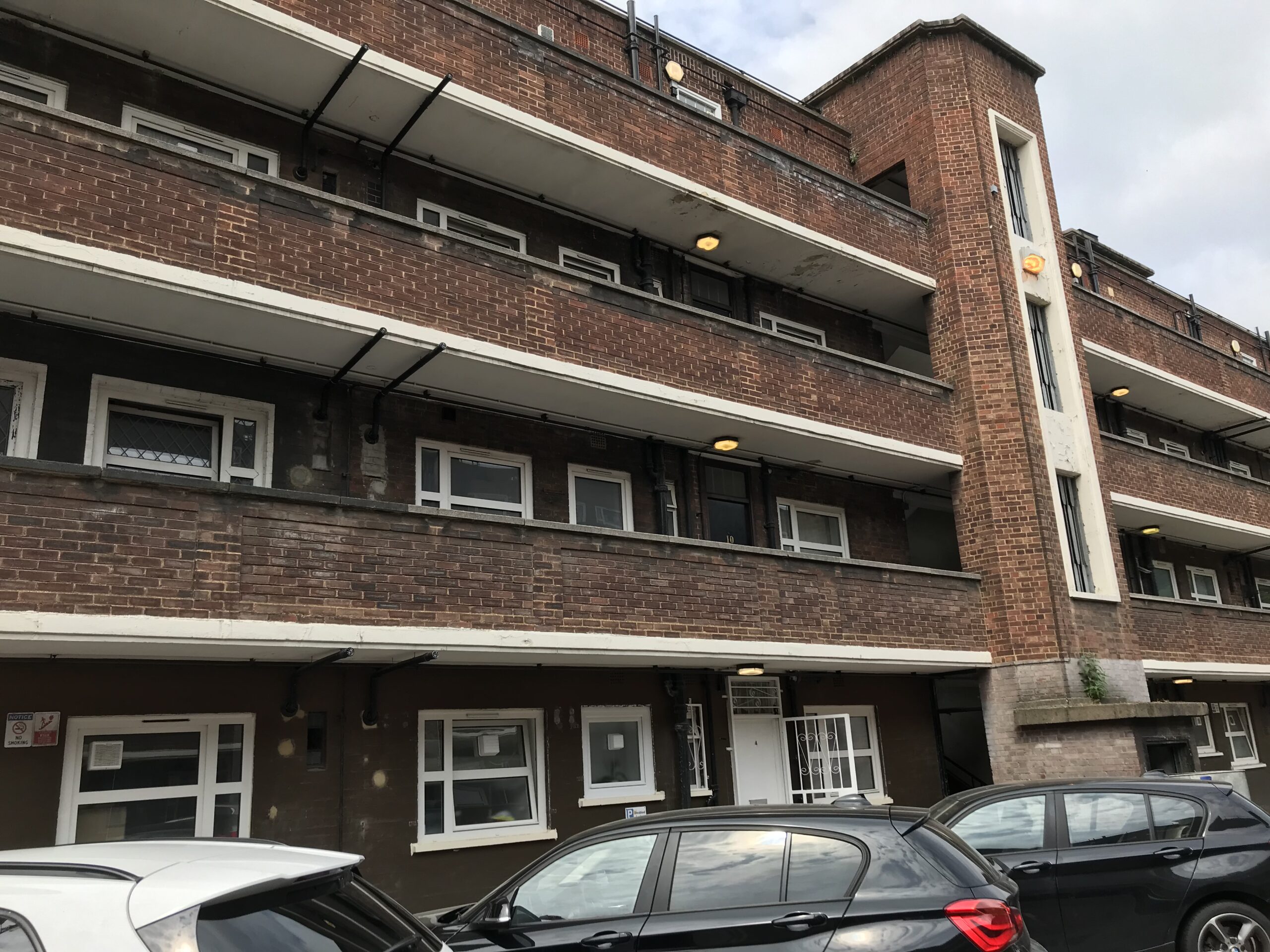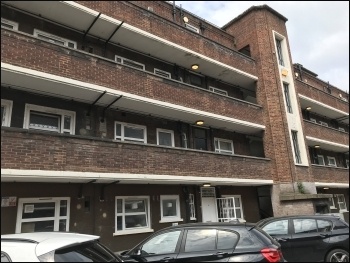In the third article in our series on Friedrich Engels, to commemorate the 200th anniversary of his birth, Niall Mulholland of the Committee for a Workers’ International (CWI) reviews Engels’ pamphlet, The Housing Question, and explains its relevance to today.
Engels published The Housing Question in 1872 as a contribution to debates about the appalling housing conditions facing the working class in Germany, Britain and elsewhere, and what should be done about it. Despite it being nearly 150 years old, Engels’ trenchant work remains very relevant in many ways as we face the most acute housing crisis in decades.
The pamphlet is a collection of articles originally published in Der Volksstaat (The People’s State), the main newspaper of the German Social Democratic Workers’ Party. Engels polemicises against Arthur Mülberger, a follower of Pierre-Joseph Proudhon (a founder of anarchism), and Emil Sax, an Austrian bourgeois economist.
Engels explains the link between the housing crisis and capitalist industrialisation and urbanisation: “…masses of rural workers are suddenly drawn into the big towns, which develop into industrial centres… workers’ dwellings are pulled down on a large scale. Hence the sudden housing shortage for the workers.”
Engels goes on to explain that industrial growth drove up land values and housing rents.
Likewise, in contemporary Britain, and internationally, severe housing shortages, overcrowding, insecure tenancies, and skyrocketing land values and rents have been a feature of the housing crisis.
Wages down, rent up
London has seen a 77% rise in rents in the last decade. Yet wages have stagnated and benefits have fallen sharply over the same timescale. The average benefit income of a family with children is £2,900 a year less than in 2011.
Tory Covid lockdown policies have compounded the crisis, causing sharp falls in workers’ incomes and widespread job losses. According to the Joseph Rowntree Trust, in Britain, there are 1.3 million in the private housing sector and 1.2 million in the social rented sector who will struggle to pay their rent over the next three months. Around 350,000 face risk of eviction.
As well as addressing the general housing crisis, Engels sharply criticised Mülberger and Sax’s analysis of the housing question and their ‘solutions’. Engels brings to the debate important aspects of the revolutionary theory of capitalism that he and Karl Marx developed. These include the differences between the tenant-landlord and worker-capitalist relationship, the nature of the capitalist state, distinctions between interest, rent, and profit, and the role of the working class in changing society.
Engels criticised the ‘Proudhonist’ moral appeal to ‘eternal justice’ to solve the ills of capitalism. Mülberger/Proudhon thought the solution to ending private landlordism was for each worker to own their own house through a ‘fair payment’ to the landlord for the actual cost of the house. By this system of mortgaging, tenants would eventually become homeowners. This would turn social relations on their head, Mülberger argued, as the “tenant is in the same position in relation to the house owner as the wage worker in relation to the capitalist”.
Engels refuted this “totally untrue” argument. Rent does not involve the exploitation of labour power and the creation of new value, as seen in worker-capitalist relations. “The worker is always cheated of a part of the product of his labour, whether that labour is paid for by the capitalist below, above, or at its value. The tenant, on the other hand, is cheated only when he is compelled to pay for the dwelling above its value. It is, therefore, a complete misrepresentation of the relation between landlord and tenant to attempt to make it equivalent to the relation between worker and capitalist.”
Sax’s housing solution was based on capitalism, but like Proudhon his proposal was that each worker should own their own house. Sax advocated factory owners allocating land and resources to workers to build their own dwellings. By becoming homeowners, workers would become ‘proprietors’ and the class distinctions and conflicts with bosses would dissipate, Sax reasoned.
This is similar to Margaret Thatcher’s propaganda just over 100 years later. Her Tory government introduced mass council house sales, at big discounts to tenants. Rather than create the ‘property-owning democracy’ envisaged by Thatcher, the so-called ‘right to buy’ policy led to today’s chronic lack of genuinely affordable housing. Private landlords bought up many of the three million former council homes, and they rent them out, often in poor condition, at extortionate rates.
For Engels, homeownership meant that “workers must shoulder heavy mortgage debts”, and were forced to live in one place.
Mortgage prisoners
Today, millions of workers face job losses or big wage cuts, and are struggling to pay mortgages. There are also two million ‘mortgage prisoners’ – leaseholders whose buildings are fitted with external cladding and without a fire safety certificate so the banks and other mortgage providers refuse to lend to their would-be buyers. Many workers are also presented with huge bills, of up to £78,000, to replace the cladding on their homes.
For Engels, housing is one of the “secondary evils that result from the present capitalist mode of production.” Under the profit system, Engels explains, housing is treated as a commodity rather than a right. Fundamental change is needed in social relations to solve the housing crisis, transforming individual ownership into collective ownership.
Engels describes how capitalism ‘solves’ the housing question in the same way it ‘solves’ the other problems it causes “…in such a way that the solution continually reproduces the question anew.”
He refers to Eugene Georges Haussmann, the ‘butcher of Paris’, who directed work on the reconstruction of Paris in 1853. Haussmann tore up Paris to create wide boulevards and a ‘luxury city’ for the rich, while the poor and workers were forced to the suburbs.
What we know today as ‘gentrification’ and “regeneration’ – the poor and working class driven out of their communities to make way for big business developers – was hypocritically deemed ‘considerations of public health and beautification’ during Engels’ time.
“The result is everywhere the same”, he writes. “The scandalous alleys and lanes disappear to the accompaniment of lavish self-praise from the bourgeoisie on account of this tremendous success, but they appear again immediately somewhere else and often in the immediate neighbourhood.”
Capitalism cannot solve the various crises of housing, Engels explains. Money (capital) flows to wherever the rate of profit is highest and leads to ‘over-development’ of cities or parts of cities. When capital becomes too concentrated and profits are squeezed, investment goes elsewhere. In recent years, big money flowed to cities like Manchester after decades of over-investment in parts of London.
Engels pointed out that many existing properties could be used in 1872 to house people: “One thing is certain: there are already in existence sufficient buildings for dwellings in the big towns to remedy immediately any real ‘housing shortage,’ given rational utilisation of them.”
There are over 600,000 vacant homes in the UK (around 225,000 vacant for six months). During the first Covid lockdown, the Tory government did what it previously said was impossible and housed 14,600 homeless people, albeit temporarily.
The expropriation of empty properties, along with a mass council house building programme, on the basis of quality, environmentally sustainable and genuinely affordable housing, are key demands of socialists today.
The Housing Question does not offer a comprehensive programme on housing, as Engels was primarily dealing with the nature of the housing crisis under capitalism. However, he emphasised that housing campaigns and reforms are based on class struggle.
Revolution from below
Mass council house building of the 20th century was a product of the strength of the labour and trade union movement, and the ruling class feared that if they did not concede such reforms social revolution could come from below. But the dismantling of council housing and the increased ‘financialisation’ of housing means solutions to the housing crisis are posed starkly again.
Socialists are to the forefront of struggling for every possible improvement in housing for workers. Militant, the forerunner of the Socialist Party, led the Liverpool City council struggle against the Thatcher government, which won significant concessions, such as the building of 5,400 council homes.
Comprehensively and permanently solving the ‘housing question’, however, can only be addressed through the socialist reorganisation of society.
“As long as the capitalist mode of production continues to exist,” Engels explained, “it is folly to hope for an isolated solution to the housing question or of any other social question affecting the fate of the workers”.









